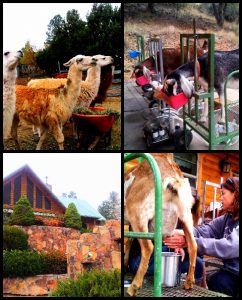There’s a new Kid in Town
by J. Adam Burch and Stacey Lane
Goat products and Goat labor offer alternatives
Tied to the trend to institute sustainable land management practices, people are looking to the past for inspiration. Increasingly, Arizona residents are discovering that herds of weed-eating, can-gnawing goats can help local landowners cut costs, boost morale and maintain a healthier relationship with the environment.Rural, unincorporated, Black Canyon City is one example of a community that is introducing working-goats as a means of reducing the underbrush in order to prevent wildfires from spreading so quickly.
The local goat-ranchers at Giddy Goat Farms have partnered with Arizona Outback Rescue to implement and promote landscaping-by goat. The use of goats greatly reduces the cost for landscaping services while reducing feed costs for the goat owners. The herds clear the land, pass organic matter in return, and are moved frequently to prevent overgrazing that can cause erosion. Efforts to introduce the working-goats stem from a desire to provide residents with the understanding that different methods can be employed to minimize local business’ overhead. The organization’s intent is to continue to introduce ways for the community to be more self-sufficient, and promote long-term agricultural goals that support a healthier lifestyle and rely less upon outside resources.
“We exist to restore confidence in a healthier and more organic lifestyle while promoting self-sufficiency in others who seek to so, as well as create awareness, support and agricultural education to not only our unincorporated communities, other rural communities, but to all future generations,” Matt Gathercoal of AZOR shared.
Members of the Arizona Outback Rescue team recently toured the neighboring town of Strawberry, Arizona, in hopes of being provided additional insight into the nature of the goat industry in Arizona. AZOR found themselves among ponderosa pine and alligator spruce, pastures dotted with llamas border the corrals housing around seventy head of goat at the Fossil Creek Creamery of Strawberry. Every morning, around fifty goats need to be milked. The llamas provide security while offering tourists the opportunity to hike alongside a woolly pack animal as they explore the forests surrounding Fossil Creek.
The Fossil Creek Creamery goats provide more than novelties like goat’s milk fudge. Licensed to supply goat’s milk and its products to the public, Fossil Creek Creamery’s owner, John Bittner, has his bleaters on a strict diet because the taste of goat’s milk is affected by what the goats eats. Moreover, visitors will experience the smells of hand- made soaps curing on the shelves tickling their senses as their eyes take in the bank of stainless steel sinks, bleached and ready to process the next batches of goat products.
Strawberry residents feel great satisfaction knowing that there are places like the Creamery, and that, no matter what, there will always be fudge. “They [the goats] are not raised for meat; they are raised for milk; they are pets; and every one has a name,” says John as he cleans one of the auto-milking machines laying in pieces in front of him.
When asked from whom he learned the goat business, he replies that he is self-taught. Milk from a cow contains a higher amount of lactose, a particular sugar that many humans have difficulty digesting. Even some human babies have a difficult time processing their mothers’ milk due to lactose intolerance Goat’s milk has much less lactose than either cow or human milk, and was the traditional alternative until formula (containing chemical derivatives of nutrients) became more readily marketed.
Some dairies charge as little as ten dollars for a gallon of goat’s milk, others as much as twenty-five after it has been processed for cheese or other products. This is nearly ten times as much as can be charged for cow’s milk. This raises questions about why only thirty-two states have lowered restrictions on raw food. Is it health concerns or money concerns that drive the market? It’s all Food for Thought.
The Fossil Creek Creamery is open daily from 10:00 a.m. to 5:00 p.m., closed Tuesdays & Wednesdays.
To learn more about Arizona Outback Rescue visit; www.azoutbackrescue.com or email [email protected]
Photos by Rapid Fire Photography; www.facebook.com/2SharpShooters









